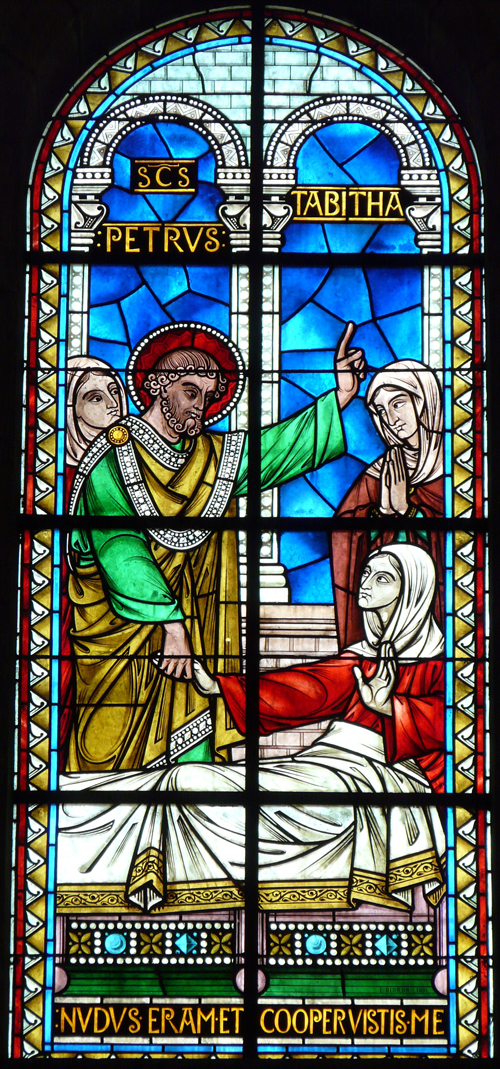 May 11, 2025
May 11, 2025
Fourth Sunday of Easter
A New Way Forward
We have a “routine” healing story this week. A beloved woman gets sick and dies, only to be raised from the dead to the amazement of everyone around. There are no magic words or incantations; no potions or gestures – just simple caring and calling her name was enough. As usual, with Biblical healing stories, the response of the crowd is delight and gratitude in what God has done, and new people coming to trust in the power of the Lord.
It’s an entirely routine miracle story, except for one rather significant detail. The healer in this case isn’t Jesus, it’s Peter. The story is set in the first-generation church, a few years after the resurrection. The author of Acts, without a lot of fanfare, sets about documenting how the disciples who learned their skills while Jesus walked among them, then set about doing all the exact same things that Jesus did before he was executed. Even healing. Even raising people from the dead.
Don’t believe the people who tell you that Jesus’ healing ministry is evidence that he was somehow unique and divine, and that nobody else should ever aspire to do what he did. Acts is very clear that Jesus is important, of course! In Jesus’ presence all sorts of things that stopped people from having life in all its fullness disappeared, and people were restored to be all they were meant to be. But it’s also very clear that Jesus came to teach other humans how to do the very same things that he did. Once they “graduated”, they set about doing exactly that.
I have as much 21st century skepticism about magical cures as the next person, but it’s clear that the storyteller in Acts is no more interested than the Gospel storytellers in explaining “how” these kinds of healings happened. The mechanism of the healing and the details of the cure are simply not included in the story. These are not training videos for doctors; they are calls to discipleship for people of God. The purpose of these stories is to encourage us to feel empowered: God can work through us to heal too.
So what does “healing” look like for those of us who are not doctors?
People get sick for lots of interconnected reasons, and our modern medical ways of treating sickness don’t address each of those reasons equally. Over the past 100 years modern medicine has focused very tightly on the organic causes of illness: germs, bacteria, viruses. We’ve focussed on physical ways to address these: vaccines, anti-biotics, surgery. Millions of people are alive and well because of those treatments, who would otherwise be dead. I count myself among those! But there are all sorts of other aspects of both illness and treatment that modern medicine doesn’t do as well. People complain about loneliness and fear; of chronic pain and abrupt personnel; of nurses who don’t have time to listen and families who feel shut out of decision-making. Specialists hyper-focus on a tiny aspect of the body and pay no attention to the big picture. Almost no one in our medical system has time to address the impact that a person’s illness is having on every other family member. Most of my pastoral care work over the past 38 years, has been with family care-givers, because the medical personnel have no time for anyone other than the identified patient.
Research shows that throughout history, supportive nursing without any other medical intervention, reduces the death rate of an epidemic by two thirds! That means that even when there is no cure, people get better when they’re cared for, and die when they aren’t! What an astonishing statistic!
Research also shows how many people are dying in our 21st century from diseases that can be addressed medically. Overwhelmingly, the people who get tuberculosis, AIDS, polio, influenza and a host of other deadly but curable diseases, die if they’re poor and get well if they’re not poor. Medicines, powerful as they are, are only a part of the solution.
The connection between the social conditions people live in and the diseases that kill them is only beginning to be investigated, but the news is grim. Poverty makes people sick. Caring makes people well. Yet we make political choices to stop trying to fix poverty, and to prevent medical personnel from taking the time to care.
We in the church have nothing to add to scientific debates about whether particular medicines are appropriate or effective. We should rightly criticize those who try to undermine science. But we have LOTS to say about the power of compassionate nursing; the needs of family care-givers; the dangers of loneliness; the impact of friendlessness; and the ways that just being in a community that cares makes everything better. The healing that comes from spiritual and compassionate sources is powerful, and necessary, and in short supply.
These stories in Acts of the disciples healing people should spark us into action, rather than skepticism. Rather than wondering HOW they effected a cure, we should take them as an example of legitimate and do-able ways that we can make a difference – for those we love, and those we don’t even know yet.
Join us on Sunday as we explore ways that ordinary people can make an extraordinary and healing difference in the lives of those around us.

 forest hill
forest hill